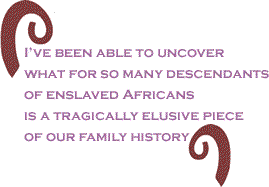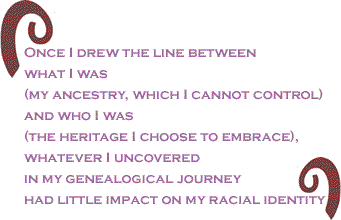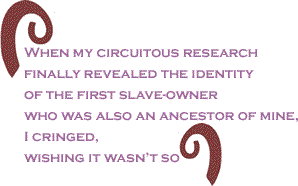
|
|||||||||||||||||||||
 |
|||||||||||||||||||||
 |
|||||||||||||||||||||
 |
|||||||||||||||||||||
 |
|
|
In just over two years of DNA testing, I may have become the most genetically well-documented Black person to date. I have cajoled and convinced relatives to assist me in this quest by swabbing the inside of their cheeks in furtherance of the family good. After more than a decade of intensive research in the tradition of our family’s elder genealogists going back three generations, I’ve been able to identify 10 distinct African lineages coursing through my body. I’ve been able to uncover what for so many descendants of enslaved Africans is a tragically elusive piece of our family history. What I initially thought was a potential means by which government agencies and eugenicists could harvest and misuse people’s genetic code, I eventually saw as a powerful tool to delve deeper into the cultural diversity of my African ancestry. But I quickly realized that the more intently I sought to learn about my Black ancestors, the more I would have to research the white people who owned them. A notable subset of the slave owners were also my ancestors. Many white people-mainstream journalists in particular-ask me how I used this technology to identify the prominent white ancestors in my pedigree. The answer is, I didn’t. It was neither my goal, nor my interest.
While I was growing up, my complexion and features constantly reminded me of this fact, a reality I only came to peace with it when I learned the distinction between ancestry and heritage. Before this epiphany, the idea of white male ancestors who owned and raped my Black female ancestors filled me with so much rage and frustration that I nearly lost the will to learn more. Genes, however, don’t tell the whole story. Often,
they only illuminate the corners of this planet from which our ancestors
hail. The larger narrative is what our forbearers chose to do in
those corners and how that, generations later, produced us and the
socio-political circumstances into which we were born. Once I drew
the line between what I was (my ancestry, which I cannot control)
and who I was (the heritage I choose to When my circuitous research finally revealed the identity of the first slave-owner who was also an ancestor of mine, I cringed, wishing it wasn’t so. When that painful experience repeated itself for the second, third, fourth and fifth time, I had to consciously choose to process these genealogical realities in a way that did not psychically relegate me to being a man who descends from multiple rapists. That’s when my epiphany came: How can I be ashamed for acts I did not commit? How can I take responsibility for the choices an ancestor-any ancestor-made decades, generations or centuries before I was even born? For that matter, how could I take pride in something I had nothing to do with?
I descend from 2 Black parents, 4 Black grandparents, 8 Black great grandparents and 16 Black great-great grandparents. Of my 32 great-great-great grandparents, at least 5 ancestors were white, slave-owning men who had relations with enslaved Black female forbearers. But for me, Ewondo, Tikar, Bamileke of Cameroon, Mende, Kru and Temne of Sierra Leone and Liberia, Ga of Ghana, Yoruba of Nigeria, Berber of Morocco and Pakistani, are a select sampling of my ancestral ethnicities that have influenced the heritage I own. When I visited the site of the antebellum Rabb plantation from where my surname comes, I longed to know about my great-great-great grandparents who were kidnapped from points unknown and despaired that it might be impossible to find the names, language, beliefs and even just that small piece of the world they called home. I always knew my ancestors had a place in history. Now, thanks to science, I know where those places are, not just in history, but on a world map and amidst the tangled, blood-drenched, but resilient roots of my ever-expanding family tree. Chris Rabb is a consultant, writer, and genealogist. Rabb's forthcoming book about his family and genealogy is called “Rivers to the Soul”. Rabb is the Founder and Chief Evangelist of Afro-Netizen and a contributor to Colorlines Magazine. He can be reached via his Website chrisrabb.com. Email him at [email protected]. |
|
| Home | |
Your comments are always welcome. Visit the Contact Us page to send e-Mail or Feedback or Click here to send e-Mail to [email protected] e-Mail re-print notice
If you send us an e-Mail message we may publish all or part of it, unless you tell us it is not for publication. You may also request that we withhold your name. Thank you very much for your readership. |
|
| September 14, 2006 Issue 197 |
||||||||||||||
|
||||||||||||||
|
||||||||||||||
| Printer Friendly Version in resizeable plain text format | ||||||||||||||
 |
||||||||||||||
 |
||||||||||||||
 |
||||||||||||||
 |
||||||||||||||
| |
||||||||||||||
| |
||||||||||||||





























